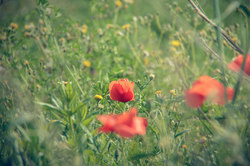 Do you spend summer a snivelling mess constantly searching for a hankie? Hay fever is a sure fire sign for many that summer is on it's way, that first tell tale sneeze in late spring as everything starts to bloom. Yup it's tissue time again. If like me you can't leave the house without a packet of tissues at this time of year our salvation may have been found....Probiotics! Researchers at Vanderbilt University School of Medicine have reviewed 23 studies analysing the most up to date data on the use of probiotics in the treatment of hay fever. They concluded that in the majority of studies patients symptoms improved significantly by using probiotic compared with those who don't. So there you have it, teeny tiny microorganisms are the answer we've been looking for! There are a number of different options available and we usually advise on particular strains of bacteria based on other health challenges. Other foods that can worsen symptoms are caffeine and alcohol and foods that contain histamine e.g., red wine, cheese, chocolate, and tomatoes. Wheat based foods can add to the inflammation for some and dairy products can increase mucus production as can sugar and excess starchy foods. Then there are those foods which are individual to you and these can be tested for via IgG Food Intolerance testing. Foods that support hayfever sufferers are those that reduce inflammation. Oily fish which increases our omega 3 fatty acids is anti-inflammatory. We can also supplement with this especially over the season. Incorporate ginger, rosemary and thyme into your cooking. Make ginger teas from fresh ginger and nettle. These foods will help counteract a runny nose and itchiness. Raw honey bought from local farms and bee keepers has been spoken about for a while and many have found taking a spoonful a day to be extremely helpful during pollen season. Supplementing vitamin C is helpful as it’s a natural anti-histamine. Most important is ensuring a rainbow diet with lots of flavonoids and a good range of nutrients. Another natural anti-histamine is quercetin found in foods such as red onion, peppers and citrus. This can be supplemented but if you are on medication, please contact a Nutritional therapist as it does have some drug nutrient interactions. Tumeric is another favourite of ours for hay fever support as research published in the journal Molecular Nutrition and food research 2008 demonstrated that turmeric prevented mast cells from releasing histamine. Oil of oregano has been shown in animal studies to prevent histamine release due to its component rosemarinic acid. Two of our favourite products for hay fever prevention combine the above to take best advantage of the latest science. These are quercetin plus and Epigenar Curcumin oregano quercetin complex. Whichever you go for, we hope that you will soon be able to leave your hankies at home!
2 Comments
|
Amazon Associates DisclosureNourishing Insights is a participant in the Amazon EU Associates Programme, an affiliate advertising programme designed to provide a means for sites to earn advertising fees by advertising and linking to Amazon.co.uk. Archives
December 2023
|
WHAT OUR CLIENTS ARE SAYING“I did Nutritional Therapy with Beverley and it was life changing. I highly recommend it!” Allison Blakely (Glasgow)
|
Contact Us |


